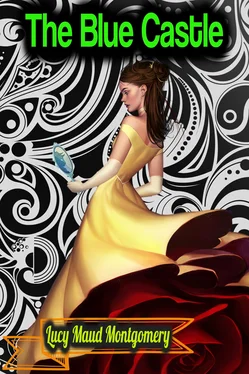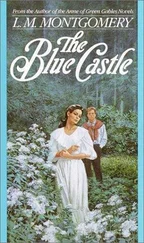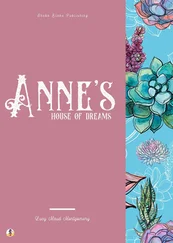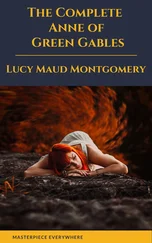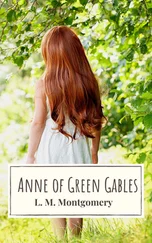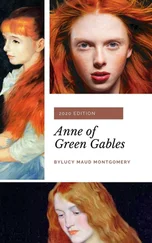"And I always will be—I know it—I can't help it. I don't know what it would be like not to be afraid of something."
Afraid of her mother's sulky fits—afraid of offending Uncle Benjamin—afraid of becoming a target for Aunt Wellington's contempt—afraid of Aunt Isabel's biting comments—afraid of Uncle James' disapproval—afraid of offending the whole clan's opinions and prejudices—afraid of not keeping up appearances—afraid to say what she really thought of anything—afraid of poverty in her old age. Fear—fear—fear—she could never escape from it. It bound her and enmeshed her like a spider's web of steel. Only in her Blue Castle could she find temporary release. And this morning Valancy could not believe she had a Blue Castle. She would never be able to find it again. Twenty-nine, unmarried, undesired—what had she to do with the fairy-like chatelaine of the Blue Castle? She would cut such childish nonsense out of her life forever and face reality unflinchingly.
She turned from her unfriendly mirror and looked out. The ugliness of the view always struck her like a blow; the ragged fence, the tumble-down old carriage-shop in the next lot, plastered with crude, violently coloured advertisements; the grimy railway station beyond, with the awful derelicts that were always hanging around it even at this early hour. In the pouring rain everything looked worse than usual, especially the beastly advertisement, "Keep that schoolgirl complexion." Valancy had kept her schoolgirl complexion. That was just the trouble. There was not a gleam of beauty anywhere—"exactly like my life," thought Valancy drearily. Her brief bitterness had passed. She accepted facts as resignedly as she had always accepted them. She was one of the people whom life always passes by. There was no altering that fact.
In this mood Valancy went down to breakfast.
3
Breakfast was always the same. Oatmeal porridge, which Valancy loathed, toast and tea, and one teaspoonful of marmalade. Mrs. Frederick thought two teaspoonfuls extravagant—but that did not matter to Valancy, who hated marmalade, too. The chilly, gloomy little dining-room was chillier and gloomier than usual; the rain streamed down outside the window; departed Stirlings, in atrocious, gilt frames, wider than the pictures, glowered down from the walls. And yet Cousin Stickles wished Valancy many happy returns of the day!
"Sit up straight, Doss," was all her mother said.
Valancy sat up straight. She talked to her mother and Cousin Stickles of the things they always talked of. She never wondered what would happen if she tried to talk of something else. She knew. Therefore she never did it.
Mrs. Frederick was offended with Providence for sending a rainy day when she wanted to go to a picnic, so she ate her breakfast in a sulky silence for which Valancy was rather grateful. But Christine Stickles whined endlessly on as usual, complaining about everything—the weather, the leak in the pantry, the price of oatmeal and butter—Valancy felt at once she had buttered her toast too lavishly—the epidemic of mumps in Deerwood.
"Doss will be sure to ketch them," she foreboded.
"Doss must not go where she is likely to catch mumps," said Mrs. Frederick shortly.
Valancy had never had mumps—or whooping cough—or chicken-pox—or measles—or anything she should have had—nothing but horrible colds every winter. Doss' winter colds were a sort of tradition in the family. Nothing, it seemed, could prevent her from catching them. Mrs. Frederick and Cousin Stickles did their heroic best. One winter they kept Valancy housed up from November to May, in the warm sitting-room. She was not even allowed to go to church. And Valancy took cold after cold and ended up with bronchitis in June.
"None of my family were ever like that," said Mrs. Frederick, implying that it must be a Stirling tendency.
"The Stirling's seldom take cold," said Cousin Stickles resentfully. She had been a Stirling.
"I think," said Mrs. Frederick, "that if a person makes up her mind not to have colds she will not have colds."
So that was the trouble. It was all Valancy's own fault.
But on this particular morning Valancy's unbearable grievance was that she was called Doss. She had endured it for twenty-nine years, and all at once she felt she could not endure it any longer. Her full name was Valancy Jane. Valancy Jane was rather terrible, but she liked Valancy, with its odd, out-land tang. It was always a wonder to Valancy that the Stirlings had allowed her to be so christened. She had been told that her maternal grandfather, old Amos Wansbarra, had chosen the name for her. Her father had tacked on the Jane by way of civilising it, and the whole connection got out of the difficulty by nicknaming her Doss. She never got Valancy from any one but outsiders.
"Mother," she said timidly, "would you mind calling me Valancy after this? Doss seems so—so—I don't like it."
Mrs. Frederick looked at her daughter in astonishment. She wore glasses with enormously strong lenses that gave her eyes a peculiarly disagreeable appearance.
"What is the matter with Doss?"
"It—seems so childish," faltered Valancy.
"Oh!" Mrs. Frederick had been a Wansbarra and the Wansbarra smile was not an asset. "I see. Well, it should suit you then. You are childish enough in all conscience, my dear child."
"I am twenty-nine," said the dear child desperately.
"I wouldn't proclaim it from the house-tops if I were you, dear," said Mrs. Frederick. "Twenty-nine! I had been married nine years when I was twenty-nine."
" I was married at seventeen," said Cousin Stickles proudly.
Valancy looked at them furtively. Mrs. Frederick, except for those terrible glasses and the hooked nose that made her look, more like a parrot than a parrot itself could look, was not ill-looking. At twenty she might have been quite pretty. But Cousin Stickles! And yet Christine Stickles had once been desirable in some man's eyes. Valancy felt that Cousin Stickles, with her broad, flat, wrinkled face, a mole right on the end of her dumpy nose, bristling hairs on her chin, wrinkled yellow neck, pale, protruding eyes, and thin, puckered mouth, had yet this advantage over her—this right to look down on her. And even yet Cousin Stickles was necessary to Mrs. Frederick. Valancy wondered pitifully what it would be like to be wanted by some one—needed by some one. No one in the whole world needed her, or would miss anything from life if she dropped suddenly out of it. She was a disappointment to her mother. No one loved her. She had never so much as had a girl friend.
"I haven't even a gift for friendship," she had once admitted to herself pitifully.
"Doss, you haven't eaten your crusts," said Mrs. Frederick rebukingly.
It rained all the forenoon without cessation. Valancy pieced a quilt. Valancy hated piecing quilts. And there was no need of it. The house was full of quilts. There were three big chests, packed with quilts, in the attic. Mrs. Frederick had begun storing away quilts when Valancy was seventeen and she kept on storing them, though it did not seem likely that Valancy would ever need them. But Valancy must be at work and fancy work materials were too expensive. Idleness was a cardinal sin in the Stirling household. When Valancy had been a child she had been made to write down every night, in a small, hated, black notebook, all the minutes she had spent in idleness that day. On Sundays her mother made her tot them up and pray over them.
On this particular forenoon of this day of destiny Valancy spent only ten minutes in idleness. At least, Mrs. Frederick and Cousin Stickles would have called it idleness. She went to her room to get a better thimble and she opened Thistle Harvest guiltily at random.
Читать дальше
